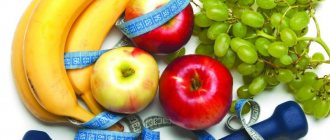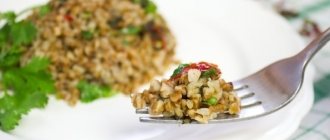Definition in science and everyday life
In botany, the concept of “fruit” does not exist: instead, the term “fruit” is used. They are divided into classes:
- pomaceous - with juicy pulp and seeds;
- stone fruit - with juicy pulp and one large stone;

- citrus fruits, tropical and subtropical - with juicy, sour and fleshy pulp, as well as those grown in certain latitudes;

- dry, also known as nut fruits , are dry, indehiscent fruits with a single seed.

In everyday life, fruits are all fruits consisting of pulp and seeds, if they have developed from a flower ovary; They are distinguished from berries by size. To create the right diet, it is enough to be guided by this definition.
The benefits and harms of fruits for the body
“Eat more fruits” is the most common recommendation from doctors. The fruits are called natural fast food: they are convenient to carry as a snack that does not require cooking.
Fruits contain many beneficial nutrients:
- they contain vitamin C, folic acid, potassium, which are lacking in the daily diet;
- Contains soluble fiber that lowers bad cholesterol levels. The component helps reduce weight, as proven by studies conducted at the Harvard University School of Public Health.
But there is also an opinion that fruits are harmful because they contain fructose. It is part of regular sugar, and its excessive consumption has a bad effect on metabolism. But fructose is harmful only in large quantities, which cannot be obtained from apples, pears or oranges.
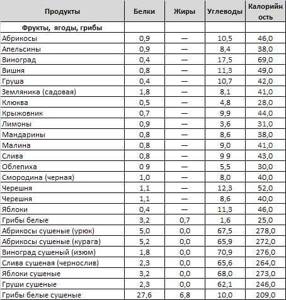
Daily norm and the result of its observance
Much of the research concerns the combined health effects of fruits and vegetables. Their total daily requirement is 400 g, which are divided into 5 servings of 80 g each. When combining fruits and vegetables in a 1:1 ratio, the share of each component will be 200 g.
A similar recommendation is made by the National Center for Biotechnology Information in the USA. His observations showed that exceeding the norm does not bring additional health benefits.
True, there is a study according to which daily consumption should be doubled. The findings, made in 2021 by doctors Dogfinn Aoun and Edward Giovannucci, still require further testing.
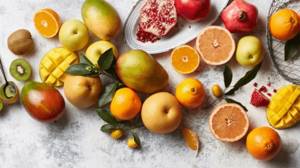
To determine your norm, adjust for gender and level of physical activity. For example, doctors in Canada advise women to eat 4 servings of fruits and vegetables per day, and men - 5 or 6. During pregnancy, you should add 1 more serving, making sure there are no allergies. Canadian doctors also recommend making adjustments to your health status so as not to worsen the condition.
If you eat dried fruit without sugar, then 1 serving will equal 30 g.
Compliance with the daily norm reduces the risk of developing the following diseases:
- cancer;
- diabetes mellitus;
- diseases of the heart and blood vessels.
The benefits have been proven by studies conducted by the US Centers for Disease Control and Prevention. And experiments by doctors Luc Dauchet and Philippe Amouel showed that each additional serving reduces the risk of heart disease by 7%. True, the result was obtained in 1 study out of 9 conducted.
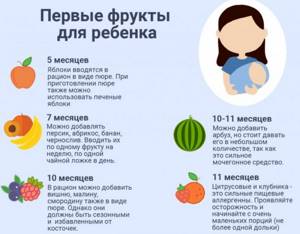
Eating citrus fruits is especially beneficial - it increases the level of citric acid in the urine. As a result, the risk of kidney stones is reduced, which was proven by employees of the University of Naples.
But for a beneficial effect, the product must be used correctly. Doctors' recommendations concern fresh fruits: candied or canned fruits do not always have a positive effect.
Is it possible to eat fruit while losing weight?

Fruits contain a large amount of minerals and plant fiber, which helps normalize the digestive process and keep the body in good shape. During the diet period, this is of particular importance, since due to poor nutrition we experience stress. But not all fruits can boast of being beneficial for your figure.
Healthy fruits for weight loss

The most effective fruits for weight loss are citrus fruits. The high content of vitamin C in the zest and pulp of the fruit allows not only to strengthen the immune system, but also to normalize the intestines. Russian seasonal fruits, such as peaches, apricots, apples, are also used in dietary nutrition, as they speed up metabolism and cleanse the body of toxins.
Harmful fruits on a diet

Of course, a person who does not have a weight loss goal can eat all fruits. However, those losing weight should limit themselves somewhat. Is it possible to eat fruits while losing weight?
First of all, limit your consumption of grapes, as they contain a large amount of sugar and their skins take a very long time to digest in the intestines. Pears should not be eaten for breakfast, as they are characterized by a fixing effect, thereby disrupting the functioning of the intestines.
What fruits should you not eat while on a diet? Try to minimize or completely limit the consumption of papaya, persimmons, pomelo, figs, dates, peaches, cherries, and mangoes. These fruits are good for the body, but contain a lot of sugar. It is for this reason that restrictions are imposed on them during diets. But while maintaining the achieved result and final polishing your figure, you can eat these fruits, only in reasonable quantities - no more than 200 g per day.
Is it possible to eat too much: features and contraindications
If a healthy person eats fresh fruit without sugar, then it is unlikely that you will be able to overeat. The fact is that they contain a high proportion of water and fiber, which cause a feeling of fullness.
Research conducted in the USA showed that only 1 in 10 people consume enough of the product. Doctors Joel Kimmons and Kathleen Gillespie conducted surveys and found that women and teenagers more often include apples, pears, and citrus fruits in their diet. Men usually receive the daily allowance in cases where they live with their family, lead an active lifestyle and do not experience financial problems.
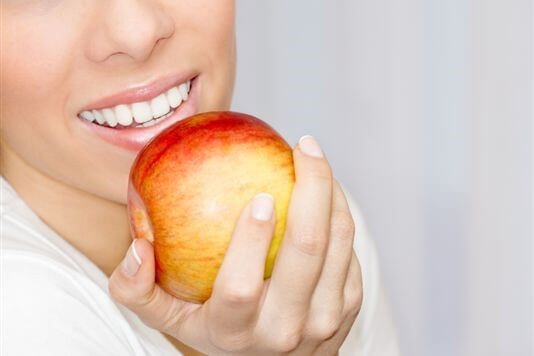
Although most people do not eat enough fruit, doctors have also studied the consequences of exceeding the norm. As part of an experiment conducted in Toronto, 10 healthy people ate plant-based fruits, vegetables and nuts. After 3 weeks of observation, doctors did not notice any negative consequences for the body, provided that there were no chronic diseases to begin with. But in order for a person to get the maximum benefit from the product, he needs a balanced diet.
Harm can be caused by fruit mono-diets or nutrition systems that imply a sharp reduction in other sources of nutrients.
Include this component in the menu with caution if you suffer from allergies or digestive disorders:
- a high concentration of acids in citrus fruits leads to exacerbations of gastritis or ulcers.
- In case of gastrointestinal diseases, it is advisable to heat treat the product. You will reduce the amount of acids in fruits, and beneficial substances will be easier to digest.
- Some varieties are high in calories, so they are not recommended for those losing weight. Banana, persimmon and mango are not suitable for those who want to lose weight.
The environmental conditions in which the fruits were grown also play a role. They have the ability to absorb toxins from fertilizers, soil, water and air. For this reason, you should not eat fruits purchased near highways. Also keep in mind that greenhouse fruits are less healthy than seasonal fruits grown in natural conditions.
Is it harmful or healthy to eat fruit for breakfast?
Fruits are best eaten an hour or two before the main breakfast. But there are fruits that you should not eat in the morning:
- Banana and avocado. They are very high in calories, so they are not suitable for those who want to lose weight.
- Pears. They have a rough texture, so they can disrupt the intestinal process.
- Grape. It contains a lot of sugar, so it is difficult for the stomach to process this fruit on an empty stomach.
It is also undesirable to eat sour fruits in the morning, as they can cause heartburn and increase appetite. If you experience fermentation in your stomach after eating fruit, then this breakfast option is not for you.
Features of the fruitarian diet
The fruitarian diet is a vegan diet that involves strict restrictions. It involves a complete rejection of animal products, including dairy. The basis of the diet is raw fruits, which can be supplemented with dried fruits, vegetables, nuts and seeds.
The system appeared at the end of the 19th century. in Europe, so it is impossible to determine the author or the exact date of creation. Fruitarianism is based not only on dietary, but also on ideological beliefs: supporters try to cause a minimum of harm to all forms of life, including plant life.
The diet has been criticized by doctors because it lacks nutrients. Dr. Natalie Olsen confirms that fruitarians are missing out on important elements:
- proteins;
- fats;
- calcium;
- B vitamins.
If you stick to a fruitarian diet for a long time, the result can be anemia, increased fatigue, and weakened immunity. Lack of calcium leads to the development of osteoporosis; the system is absolutely not suitable for children, adolescents, pregnant women, people with diabetes or prediabetes.

Before you try eating fruit, even if it’s not strict, consult your doctor. If you take medications or suffer from chronic illnesses, a fruitarian diet may be harmful to your health. Your doctor should assess your individual risks and help you create a menu to suit your needs.
The healthiest and most affordable fruits in the diet
Fruits come in many varieties, each with their own properties: consider them when determining your diet.
Apple
One apple a day may be enough to keep you from seeing a doctor:
- contains phenols - substances that normalize cholesterol levels in the blood. As a result, the risk of developing heart and vascular diseases is reduced. The feature was confirmed by research conducted by doctors Athanazios Koutsos and Samantha Ricadonna;
- The apple also contains antioxidants - components that prevent the occurrence of chemical reactions dangerous to the body caused by free radicals. Flavonoids present in the fruit protect against Alzheimer's and Parkinson's diseases. According to nutritionist Jacqueline London, the substances improve brain activity in general;
- apples stimulate the production of bile and gastric juice, which is good for digestion.
How should I include a component in the menu? Give preference to red varieties, which contain more anthocyanins - substances that have a beneficial effect on cholesterol levels. They are also richer in fiber, calcium, phosphorus and vitamin K. But Granny Smith is higher in vitamin A, so add that variety to your diet as well.
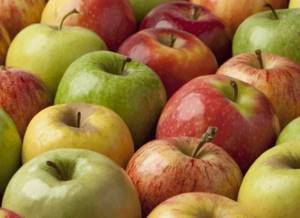
The advantage of apples is that they can be heat treated. Some vitamins will be destroyed, but instead of them, the antioxidant pectin will be formed - a component that protects against aging. It prevents the development of cancer, so add baked apples to your diet.
Pear
The list of healthy fruits also includes pear: 2 pcs. per day will complement your menu. One medium-sized fruit contains the following nutrients:
- 1 g protein;
- 27 g carbohydrates;
- 6 g dietary fiber;
- 12% of the daily value of vitamin C;
- 6% of the daily value of vitamin K.
Pears are also a source of copper, which strengthens the immune system and has a beneficial effect on the nervous system. One fruit is enough to cover 16% of the body's daily needs. The product also contains potassium, which is responsible for heart function and muscle contraction.
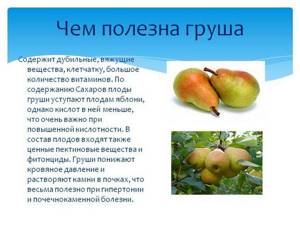
Pears also contain polyphenols, antioxidants that protect cells from free radicals. There are 6 times more of them in the peel than in the pulp, so eat the whole fruit. And the flavonoids contained in pears reduce inflammatory processes in the body. The benefits of the component were proven by observations conducted as part of the Baltimore Longitudinal Study of Normal Aging.
Plums
One fresh plum contains only 30 kcal. But it is rich in nutrients:
- 1 g dietary fiber;
- 8 g carbohydrates;
- 5% daily value of vitamin A, 10% of vitamin D, 5% of vitamin K.
Plums contain polyphenols - substances that strengthen the skeletal system. They reduce the risk of developing diabetes and cardiovascular diseases. Research conducted at the University of California by doctors Maria Gil and Francisco Tomas-Barberan showed that plums contain more beneficial components than peaches and nectarines. And animal experiments conducted at Cornell University confirmed the anti-inflammatory effect.

Plum and its fresh juice help with constipation, although you should not lean on the product. Limit intake to 45-85 grams per day to avoid diarrhea.
Oranges
Oranges will help you get the required amount of vitamin C and potassium. They also contain flavonoids - plant pigments that slow down inflammatory processes in the body. Nutritionist Jennifer Hyland recommends them for those planning a snack before a run or other aerobic activity.
Orange contains 3 types of sugar:
- glucose;
- fructose;
- sucrose.
But the component has a low glycemic index - the natural substance is slowly absorbed. The indicator is due to the high content of polyphenol and fiber, which slow down the rise in blood sugar.
The downside of orange is that it is often consumed in juice form. The store-bought product contains regular sugar, which affects body weight. Oranges also contain acids that affect tooth enamel. The harm is comparable to that caused by sweet soda, one of the main causes of tooth decay.
Nutritionist Jacqueline London still does not advise giving up oranges. Eat a citrus fruit a day, and then drink a glass of sparkling water to normalize the acid-base balance in your mouth.
Bananas
Bananas are known for their high potassium levels, giving you 12% of your daily value. It is also rich in carbohydrates, and they are found mainly in green fruits. They contain resistant starch, a substance that is resistant to digestion. According to the observations of doctors A. Raben and A. Tagliabu, conducted in Denmark, the component creates a feeling of satiety for a long time.
Bananas also contain pectin, a substance that has a beneficial effect on the digestive system. Research conducted at the State University of New York speaks about its benefits. In their course, it was possible to prove that pectins help with sugar intolerance.

Bananas can be included in your diet, but you shouldn’t rely too much on them, just like any other component. 1-2 per day is enough, and choose fruits that are not too ripe.
Exotic fruits: harm or benefit
Nutritionists from the National Center for Complementary and Alternative Medicine recommend eating pineapples. They contain bromelain, an enzyme that promotes weight loss.
The center’s doctors also conducted studies that showed that the component helps with sinusitis. There are also suggestions that bromelain is useful for osteoarthritis, but additional experiments are needed for a final conclusion.
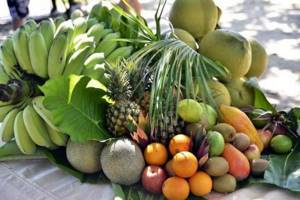
Avocados are also considered exotic varieties; the American Heart Association has stated the importance of this fruit for humans. It contains monounsaturated fats, which reduce the likelihood of stroke and heart attack.
The following exotic varieties are distinguished:
- Durian is rich in vitamin C - 1 cup of pulp satisfies 80% of the daily requirement. It contains copper, folic acid, manganese and antioxidants, which is why it is called the king of fruits;
- guava completely covers the daily need for vitamin C. It reduces the risk of developing chronic diseases, which was proven by observations conducted at a private university in Taiwan;
- Papaya contains the antioxidant lycopene, a component that has an anti-cancer effect. Its properties were confirmed by doctors Aneta Gadzhovik and Malgorzata Dobrynska.
But not everything is perfect, because the exotic fruits on supermarket shelves were picked a couple of months ago. The beneficial substances in them lose their potency, so you can refuse rare treats.
If you come to the country of origin of guava or durian, be careful. Unusual substances put a strain on the liver and stomach, so start with a small portion. Regular seasonal fruits will still be safer if they are grown in environmentally friendly conditions.
Is it healthy to eat fruit for breakfast?
If you want to have fruit for breakfast, choose from the following list:
- apples;
- kiwi;
- mango;
- grapefruit;
- orange.
People who have increased stomach acidity should be careful when eating sour apples on an empty stomach. It is better to give preference to sweet varieties. Apples lower cholesterol levels, stimulate the elimination of toxic substances and start metabolism.
Nutritionists advise starting the day with a couple of kiwis, which trigger the metabolic process in the body. Citrus fruits have a lot of vitamin C, and they are great for invigorating and uplifting. Mango is not such a common and popular fruit on our table. This is not at all deserved, since it contains almost all micronutrients.
How to eat properly
For a menu component to be beneficial, it must be used correctly. And nutritionists are still arguing about when it is better to eat apples, pears or other similar foods:
- There is an opinion that with proper nutrition, it is advisable to eat fruits in the morning. First, drink a glass of water and wait 30 minutes. and start your main meal. This method is suggested by Constance Novis, author of the bestselling book Healing Foods;
- nutritionist Natalie Olsen claims that the fruit part of the diet is best consumed during the second breakfast. It is suitable as a snack at work, which is useful for weight loss. After all, people often do not have a full meal, but eat a sandwich with bread or pastries. For those who strive to be slim, it is better to include fruit salad in the menu.
During the day, it is not advisable to combine fruits with other products. Otherwise, you will start the fermentation process in the stomach and intestines, which can lead to bloating, gas and pain. To reap the benefits, consume them with a separate meal or 30 to 60 minutes before. before the main meal.
Citrus fruits and other fruits should be consumed 30-60 minutes before the main meal, and not for dessert after meals, as was previously taught. This is due to the fact that fruits are not digested in the stomach, but almost immediately pass into the intestines! Therefore, if the stomach is full, the fruit stays in it for a long time and the process of fermentation begins.
Should you eat fruit after 16.00? Many people who are losing weight do not want to overeat in the evenings and hope to satisfy their hunger with an apple. But sweet-sour or sour varieties stimulate the production of gastric juice: the result is breakdown and overeating. If you eat sweet fruits, then you will load the pancreas, which is unacceptable before bed.
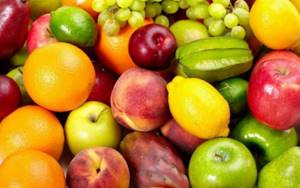
But it is permissible to combine fruits with each other, especially sweet or semi-sour ones. The exceptions are peaches and grapes, which are better absorbed if eaten separately from other foods.
Persimmon with apple are suitable for salad; The delicacy is also combined with cream or sour cream, not forgetting to count calories. Sour varieties go well with nuts, cheeses and herbs.
For breakfast to be truly healthy and tasty, you only need to meet two conditions. The first thing is to always remember the formula for a healthy breakfast: “protein + healthy fat + fiber.” Secondly, know the characteristics of your body and the foods that are safe for you.
Examples of proper breakfast
Together with nutritionist, eating behavior correction specialist and fitness instructor Anastasia Buzunova, we have compiled a rating of breakfasts that you can try in the next morning - it will be tasty, simple and healthy.
For example, shakshuka is a dish of eggs fried in a sauce of tomatoes, hot peppers, onions and seasonings. You will need two onions, a red or green pepper, a couple of tomatoes and eggs, some cheese, salt, seasonings and, if desired, coconut milk.
— Cut the onion (as you wish), put it in a frying pan greased with coconut or ghee and simmer for a couple of minutes. Cut the pepper and add it to the onion. Then we cut the tomatoes and also add them to the frying pan. Close the lid and simmer for two to three minutes. When the vegetables become soft, add a spoonful of coconut milk (but you can do without it), salt and add seasonings, break the eggs. Add grated cheese and close with a lid. When the egg turns white and the yolk has hardened, you can remove it,” Anastasia Buzunova shares the recipe.
If you don't want to cook shakshuka, a more familiar omelet would be a great breakfast dish. Just add a little cheese, 9% cottage cheese and herbs to it - it will be both tastier and healthier.
And don’t forget about hot sandwiches - they are also not included in the morning ban. Ideally, these will be sandwiches on unleavened bread, with turkey, tomato, herbs, sour cream and cheese.
If you want something more exotic, try a Scandinavian breakfast. This is a baked avocado that will take you 20 minutes to prepare. You will need an avocado (ripe), a couple of eggs, salt and pepper.
— While the oven is heating up to 200 degrees, cut the fruit into halves, remove the pit and a little pulp to make room for the egg. Break an egg into the resulting wells, add salt and pepper and place in the oven for 15–18 minutes. The white should be baked, and the yolk should remain liquid, it’s tastier,” says Anastasia Buzunova.
Well, if you like pancakes, make them from oatmeal. You will need 30-40 grams of cereal and one egg. Prepare the filling to taste. For something more serious, curd cheese, cucumbers, tomatoes, avocado, chicken and fresh herbs are suitable; for something sweet – peanut butter, banana, cinnamon, coconut and berries. Just mix oatmeal and egg, fry in a frying pan on both sides and cook, covered, until cooked. Afterwards, fill with filling to your taste.
What else to consider
When creating your menu, include ripe fruits to avoid causing diarrhea. They should not have rotten areas, dents or other signs of poor quality.
In addition to fresh fruits, you can include frozen fruits or dried fruits that do not contain sugar in your menu. They are obtained by drying in the sun or using special equipment that retains most of the vitamins. During heat treatment, beneficial nutrients are destroyed; You shouldn’t overuse preserves either, because compotes and preserves contain sugar.
Are you eating enough fruit?






